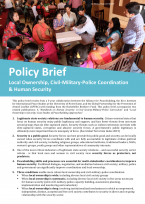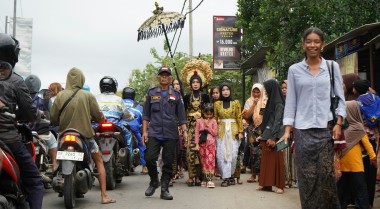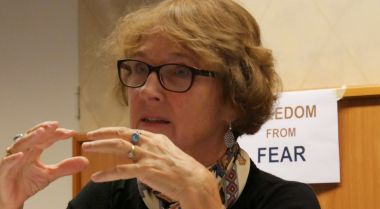
Local Ownership, Civil-Military-Police Coordination & Human Security
This policy brief results from a 3-year collaboration between the Alliance for Peacebuilding, the Kroc Institute for International Peace Studies at the University of Notre Dame, and the Global Partnership for the Prevention of Armed Conflict (GPPAC) with funding from the Rockefeller Brothers Fund. This policy brief accompanies two related publications: A “Handbook on Human Security: A Civil Society-Military-Police Curriculum” and “Local Ownership in Security: Case Studies of Peacebuilding Approaches.”
-
Legitimate state-society relations are fundamental to human security. Citizen-oriented states that focus on human security enjoy public legitimacy and support, and face fewer threats from non-state armed groups than do elite-captured states. Security threats such as violent extremism correlate with elite-captured states, corruption and abusive security forces. A government’s public legitimacy is ultimately more important than its monopoly of force. (See Global Terrorism Index 2015)
-
Security is a public good. Security forces can best provide this public good and security can be locally owned when security forces coordinate with and are fully accountable to legitimate civilian political authority and civil society, including religious groups, educational institutes, traditional leaders, NGOs, women’s groups, youth groups and other representatives of community interests.
-
One of the most critical indicators of legitimate state-society relations – and successful security sector reform - is that local men and women in civil society view security forces as protectors, not predators.
-
Peacebuilding skills and processes are essential for multi-stakeholder coordination to improve human security. Facilitated dialogue, negotiation, and mediation between civil society, military, police and government can significantly improve coordination and local ownership.
-
Three conditions enable more robust local ownership and civil-military-police coordination:
- When local ownership is wide; including diverse local civil society groups
- When local ownership is systematic, including diverse local civil society in five areas necessary for human security (joint civil-military-police capacity building, assessment, planning, implementation and monitoring and evaluation)
- When local ownership is deep, involving institutionalized mechanisms in which an empowered, independent, distinct, accepted and free civil society contributes to security in direct and on-going relationship with the security sector.



